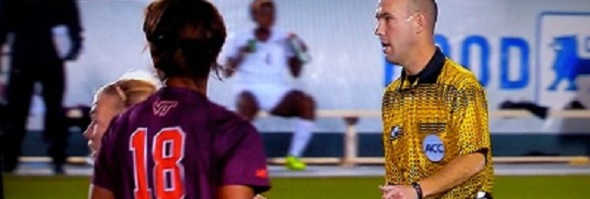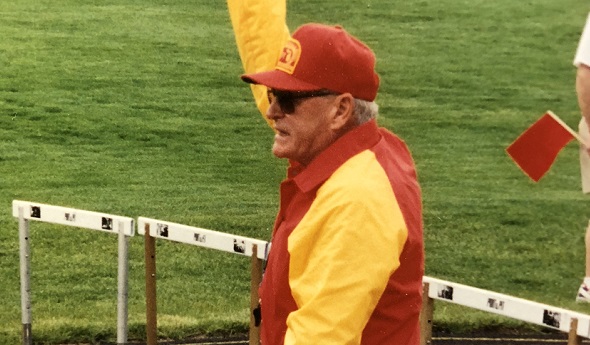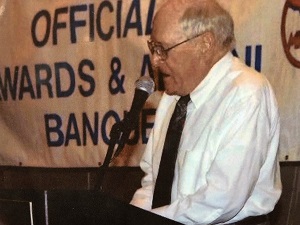
All in the Details
December 3, 2015
By Brent Sorg
Collegiate official & MHSAA coach
In my experience as both an official and coach, my partners or officials assigned to work my match are judged the moment we meet and make contact. That is human nature.
What is important is to make that first impression a positive one. At first contact, when greeting an administrator, coach or fellow official, look the person in the eye when shaking hands and be sincere in your greeting. When the person speaks, look them in the eye and listen. Sounds simple, yet I’ve seen many fail at this task and thus set themselves up for a difficult match.
The next moment of impact is the conversations that take place. It is totally acceptable to have a laugh and a joke, but be sure the environment and timing is right. You may ask, “Who is to judge when the time is correct?” It is all a feeling – a sort of sixth sense. I have witnessed on numerous occasions during the pregame check-in where officials “dig their own grave” by telling the players how they are going to call the game. Then they continue with how they will only talk to the captain. That is nonsense! In the business of managing people, it is imperative to deal with everyone involved in the game.
Once the match begins, the next task to strive for is not looking at the ball the entire time. From the first class I took on officiating, I was told the ball never commits a foul. In my 25 years, this is still true. Look ahead, scan the field, watch the players battling for position prior to the ball arriving. If one of the backs has the ball at his feet and is under zero pressure, there is no need to watch him pass the ball. Look instead at the forward checking back who is tightly marked by an opposing defender.
The game continues to evolve with faster, smarter, and more creative players. The coaches are implementing tactics to create every advantage possible. As you go about the game as the center official, don’t just judge fouls/non-foul moments, but expand your knowledge. What are the tendencies of certain players on the field? Are teams looking to build up or are they using a more direct style of play? This will help with your positioning and anticipating movement.
Almost every match has at least one defining moment that you as the referee must have the courage to deal with. It is often referred to as the “moment of truth.” It could mean you rule it is not a foul and don’t even have to blow the whistle, but you must deal with dissent. Or it could mean a stern talking to the player, issuing a caution, or showing the red card. Reflecting on the mentors I have had over the years and those I still look up today, I think about a consistent theme heard from all: Make sure you get something out of each caution or send-off.
Be brave. Make the tough decisions. Remember, the players are the ones who commit fouls forcing us to make certain decisions.
Many of you watch professional games on television, and I think we can all learn from them. In particular, I think the EPL (English Premier League) referees do an excellent job of isolating the guilty player, explaining the decision, and then showing the card. All while looking the player square in the eyes.
Your mindset to a match should be one of teamwork and one that fosters harmony with the players on the pitch. Not an “us vs. them” mentality.
Finally, be willing to admit a mistake. You are not perfect! You are a human being. It is OK to admit an error, but be genuine about it. Be sympathetic when appropriate. Be firm yet fair.
Most importantly, enjoy.
Sorg is a former National Referee and current NISOA Referee (ACC, Big Ten, Big East, Horizon, Conference USA, MAC); he also is a high school boys head coach who recently concluded his 11th season.

The Official View: A Shining Example
By
Brent Rice
MHSAA Assistant Director
October 15, 2018
By Brent Rice
MHSAA Assistant Director
This week we honor our first “Official of the Month” – Rockford’s Lyle Berry – and offer a reminder on postseason invitations while also taking a look at a few situations officials may encounter in volleyball and football.
It’s Official!
Postseason tournament officiating invitations have been released in all of our fall sports. Make sure if you were selected to get your acceptance/declination confirmations in as soon as possible. If we fail to receive an acceptance for the position, we will have to remove your name from the consideration list for this season.
Rule of the Week
VOLLEYBALL Team R’s first contact is an overpass that lands on top of the net and settles briefly. Team R’s backrow setter, while still standing on the floor, reaches up and taps the ball to the floor on Team S’s side of the court.
Ruling: Back-row attack, point for Team S.
It’s Your Call
FOOTBALL The old Swinging Gate. There are a number of fouls on this play. Which do you see?
Last Week’s IYC Ruling: Player #4 in white commits two fouls on the play. First, he make an illegal block below the waist in order to take out the lead block by the pulling guard. Then, as the running back scrambles to look for more yards, #4 returns to the pile and makes illegal helmet contact (spearing) with the runner. Both are live ball fouls with 15-yard penalties. They both occur at about the 22-yard line where the run ends, so either could be accepted/declined for the same result. (Click to see the video from last week.)
The Official View - Official of the Month
October: Lyle Berry, Rockford
After 59 years as an MHSAA registered official, Lyle Berry says his time wearing the emblem is winding down. “I’ll believe it when I see it,” his wife regularly reminds him.
Even though Lyle hasn’t been on the hardwood serving as a basketball referee since 1988, he has remained a staple in cross country and track & field meets across the state. The 2012 Vern Norris Award winner, Berry has been honored by serving as an official in 17 MHSAA Finals.
“If you’ve never stood at the finish line to watch two athletes give everything within themselves to be the first to cross, you have missed the boat,” said Berry as he provided his best example of the ABC-coined phrase, “The thrill of victory and the agony of defeat.”
 It’s working with young people that has kept him coming back year after year. And not just the competitors – Lyle has had the privilege of starting many officials on their way and enjoyed the thrill of seeing them grow and succeed.
It’s working with young people that has kept him coming back year after year. And not just the competitors – Lyle has had the privilege of starting many officials on their way and enjoyed the thrill of seeing them grow and succeed.
But for all of his officiating accomplishments, they don’t compare to that spring day in 1959 when he married the love of his life, Vonna.
Prior to getting married, Lyle was a seven-time letter earner in three sports while attending Grand Rapids Central High before attending Grand Rapids Junior College. He was the first at that school to earn four letters in one year before moving on to Central Michigan University, where he played baseball. Together, Lyle and Vonna raised three sons who all proved to be good athletes as well. He served as a teacher and coach at four schools until his retirement in 1991. Through it all, Vonna has been at Lyle’s side, encouraging him to reach for his goals in athletics and officiating.
He got his start in officiating by serving in the college intramural program. He learned quickly that it wasn’t easy as he had imagined during his early days of playing sports. He credits his longevity to his love of sports and remaining involved in them. It certainly wasn’t the $1.50 he made in his start in basketball refereeing!
Lyle Berry is a shining example of what the MHSAA looks for in its officials: Dedicated and hardworking men and women who desire to make a positive impact on the next generation of student athletes. The privilege, Lyle said, is one that he “would do most anything to have continue for many years to come.”
It’s our privilege, Lyle, and we wish you many more years of continued success in officiating.
PHOTOS: (Top) Lyle Berry starts a race during a track & field meet. (Middle) Berry speaks at an MHSAA Officials Awards Banquet.

